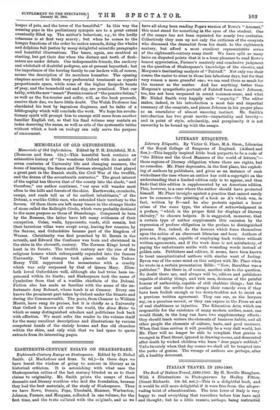LITERARY ETIQUETTE.
Literary Etiquette. By Victor G. Plarr, MA. Oxon., Librarian of the Royal College of Surgeons of England. (Adlard and Son.)—This happily inspired little book purports to be a code of "the Ethics and the Good Manners of the world of letters,"— those regions of literary obligation where there are rights, but no remedies. Mr. Plarr deprecates, in the first place, the exploit- ing of authors by publishers, and gives as an instance of such wickedness the case where an author has sold a copyright on the understanding that a limited edition only is to appear, and then finds that this edition is supplemented by an American edition. This, however, is a case where the author should have protected himself. Mr. Plarr inveighs against a practice that cannot surely now be common—the printing of a book as A's which was, in fact, written by B—and he also protests against a lesser crime of the same type, the absence of acknowledgment in a preface, "which is the proper field for displays of literary chivalry," to obscure helpers. It is suggested, moreover, that a certain type of author supplements this omission by the expression of profuse obligation in the preface to distinguished persons. Nor, indeed, do the horrors which force themselves upon the notice of an observant librarian end here. Authors of sorts are, it appears, capable of employing hack writers without written agreements, and if the work done is not satisfactory, of paying the unfortunate scribe with wounding words instead of golden coin. Publishers and editors, it seems, have been known to treat unsophisticated • authors with similar want of feeling. Byron was of the same mind on this subject with Mr. Plarr when he wrote in a certain presentation Bible : "Now, Barabbas was a publisher." But there is, of course, another side to the question. No doubt there are, and always will be, editors and publishers capable of shabby things, and rich men, desirous of the painful honour of authorship, capable of still shabbier things ; but the author and the scribe have always their remedy even if they have been foolish enough or too down-trodden not to insist on a previous written agreement. They can sue, as the lawyers say, on a quantum meruit, or they can expose in the Press an act of real shabbiness or injustice. The Education Acts, which are responsible for the existence of many modern scribes, must, one would think, in the long run have two supplementary effects : they should teach writers the elements of business habits, and all other people the elements of culture, taste, and good manners. When that time arrives it will possibly be a very dull world, but Plarr will no longer be able to complain that genius is wronged in Fleet Street, ignored in drawing-rooms, and desecrated after death by wicked children who burn "dear papa's rubbish." Unfoi twiately when that day comes we shall all be tempted into the paths of genius. The wrongs of authors are perhaps, after all, a healthy deterrent.






















































 Previous page
Previous page